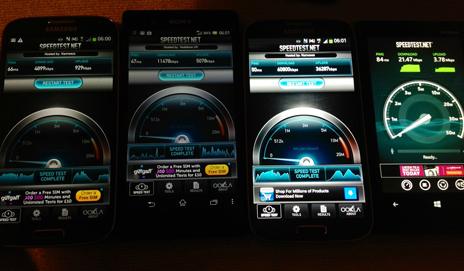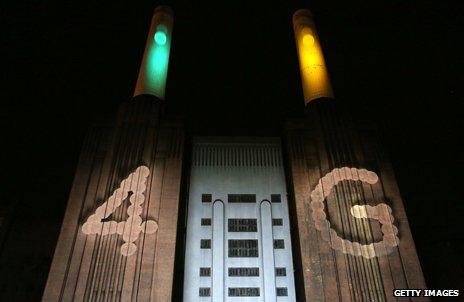4G or not 4G? That is the question
- Published
- comments

It wasn't exactly a scientific experiment. But so keen was I to get an early flavour of the UK's 4G battle that I sat on my sofa this morning at 6am running speed tests on four smartphones.
After 10 months in which EE has had the 4G field to itself, Vodafone and O2 joined the fray this morning, albeit with very limited launches. Just how limited became clear with those speed tests in my living room.
Although both are launching in London - O2 is also in Leeds and Bradford - neither of the two 4G newcomers has yet reached the west London suburb where I live. So O2 delivered a download speed of 4 Mbps (megabits per second), with Vodafone clocking in at 11.5 Mbps - pretty respectable but not superfast.
The EE smartphone gave a blistering speed of 61 Mbps, with the upload at 36 Mbps - an impressive demonstration of what 4G can deliver, at least when there is little other traffic around. That kind of performance would make a mobile broadband dongle a more than acceptable replacement for fixed broadband - although EE's data tariffs might make it prohibitively expensive for heavy users.
But the real surprise was the smartphone on Three's network - which is not yet 4G. It provided a very impressive download speed of 21 Mbps. Three has been claiming that its souped-up 3.5G phone can give customers the 4G experience without needing a new phone or a more expensive contract - and this test seems to back that up. Three is not launching its 4G services until the end of this year - but hopes to catch up by promising that its customers won't pay a premium for the product.
I did also test the Vodafone and O2 phones in central London, where their brand new 4G networks did perform very impressively, with speeds of more than 60 Mbps in both cases.

4G was launched with a bang in the UK - but should consumers care?
These are just snapshots of the early stages in a 4G battle - but they may tell us something about how it will shake out. The Vodafone and O2 launches have been relatively muted - certainly compared with the huge sums that EE spent last year - and there is a sense that they are waiting for a while before really pressing the accelerator.
One factor in their thinking may be the launch of Apple's latest iPhone, expected in a couple of weeks. The iPhone 5, configured to work on the 1800 Mhz spectrum that EE uses, has been a key weapon it its armoury but does not work with O2 or Vodafone's flavours of 4G. They will be betting that the latest version will be compatible with their networks, and as they roll out their networks across more of the country in the run-up to Christmas, both companies will then hope to start making inroads into EE's lead.
But from a consumer's point of view, the 4G experience in the UK remains somewhat underwhelming. They are being told they will probably need new phones on complex tariffs that look expensive for anyone who plans to make full use of the higher speeds that the technology promises.
Make no mistake, 4G is vital in providing extra capacity for operators struggling to cope with ever more data, and could one day be important in plugging gaps in superfast broadband coverage in rural Britain. But many consumers will be waiting for better coverage and lower prices before they are convinced that this revolution is one they need to join.